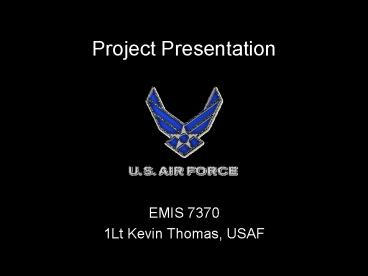Project Presentation - PowerPoint PPT Presentation
1 / 14
Title:
Project Presentation
Description:
Project Presentation EMIS 7370 1Lt Kevin Thomas, USAF Sample Acquisition Sample 1 obtained from KC-135 flight records at ... – PowerPoint PPT presentation
Number of Views:62
Avg rating:3.0/5.0
Title: Project Presentation
1
Project Presentation
- EMIS 7370
- 1Lt Kevin Thomas, USAF
2
Course Project Background
- Background
- The Air Mobility Command of the USAF spent 1.3
billion in fuel costs in 2005 and 1.6 billion in
2006. With the ever-rising prices of oil, fuel
conservation is becoming ever-more important.
Recently, AMC implemented aircraft fuel
conservation procedures to curb the rising costs
and save fuel for the furthering of mission
execution and training objectives. - Goal
- To test the hypothesis that the
- recently implemented procedures
- are resulting in fuel conservation
3
Sample Acquisition
Two different random samples (n 50) of
fuel flow rates obtained
- Sample 1 obtained from KC-135
flight records at
Grand Forks AFB, North Dakota from Oct 2006
- Sample 2 obtained from KC-135
flight records at deployed
location in Southwest Asia from Oct -
Nov 2007
4
Assumptions
It can be assumed that the fuel conservation
procedures are not implemented in deployed
locations as mission execution dictates the
procedures flown. Thus, we can compare the two
sets of data to see what impact, if any, the fuel
conservation procedures have on average fuel flow
rates.
5
Sample Data and Scatter Plot
By visual inspection of the scatter plot, there
seems to be no trend in either set of data.
6
Statistical Analysis
Box Plots
7
Histograms
Local Histogram Deployed
Histogram
8
Probability Plotting
From the probability plots, both sets of data can
be estimated to have normal distributions with
the approximate parameters shown.
9
Estimation of Normally-distributed Means
10
Estimation of Difference of
Two Normally-distributed Means
11
Hypothesis Testing
We test the null hypothesis that the two means
are statistically equivalent at the 5 level of
significance. Based on the resulting t-score,
we reject the null hypothesis and accept the
alternate hypothesis that the local fuel flow
rates are statistically significantly lower than
the deployed fuel flow rates.
12
Conclusion
Based on the preceding statistical analysis and
hypothesis testing of the two random samples, we
can conclude that the AMC fuel conservation
procedures are effective in conserving fuel
during local AMC missions.
13
Recommendations
It is recommended that AMC continue to stress the
importance of fuel conservation procedures and
that AMC crewmembers understand the impact such
procedures have as they seek to fully implement
them.
14
Sources
Schanz, Marc V. The Fuel War. Journal of the
Air Force Association. June 2007, Vol. 90, No.
6. www.afa.org/magazine/june2007/0607fuel.ASP































